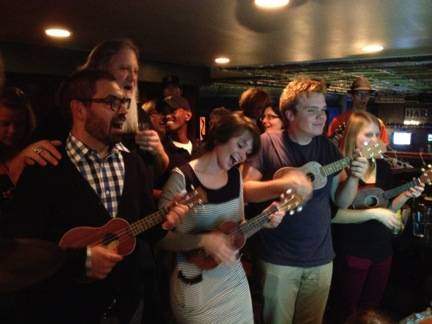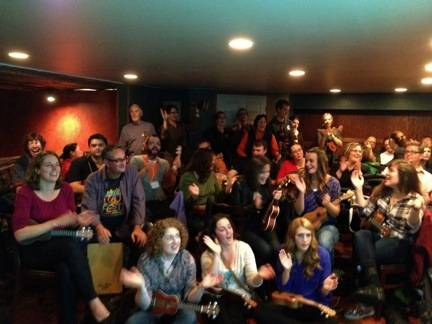 Who doesn’t love a good sing-along? The fourth annual Folk and Roots festival in Urbana provided several opportunities for the community to join together in song. On Saturday afternoon the Homebrew Ukulele Union (HUU) joined forces with the Robeson Elementary School ukulele club and the crowd at the Independent Media Center to sing, play, and participate in this democratic form of music making. In a world where music is something to be bought and consumed, the sing-along stands as a reminder that music is really about people.
Who doesn’t love a good sing-along? The fourth annual Folk and Roots festival in Urbana provided several opportunities for the community to join together in song. On Saturday afternoon the Homebrew Ukulele Union (HUU) joined forces with the Robeson Elementary School ukulele club and the crowd at the Independent Media Center to sing, play, and participate in this democratic form of music making. In a world where music is something to be bought and consumed, the sing-along stands as a reminder that music is really about people.
 Saturday’s sing-along included a mix of folk and pop favorites. Starting off with “This Land is Your Land” and ending with a great version of “Hey Jude,” the na-na-na’s were in full effect. For the most part, the crowd, made up of students, parents, and festivalgoers, jumped in pretty quickly, though some folks took a while to get into the spirit. Several of the children had come not only with parents, but with grandparents and siblings as well. It was great to see such intergenerational connections being made. The HUU were mingled right in with the kids and it was wonderful to watch those two groups interact. There was a sense of community in the room, of shared experience through music, and it left a smile on many a face.
Saturday’s sing-along included a mix of folk and pop favorites. Starting off with “This Land is Your Land” and ending with a great version of “Hey Jude,” the na-na-na’s were in full effect. For the most part, the crowd, made up of students, parents, and festivalgoers, jumped in pretty quickly, though some folks took a while to get into the spirit. Several of the children had come not only with parents, but with grandparents and siblings as well. It was great to see such intergenerational connections being made. The HUU were mingled right in with the kids and it was wonderful to watch those two groups interact. There was a sense of community in the room, of shared experience through music, and it left a smile on many a face.
Music teacher Sarah Filkins co-leads the Robeson Elementary ukulele club with 5th grade teacher Mary Anne Jusko. As a member of the HUU, I’ve had the pleasure of playing with Sarah, Mary Anne, and the Robeson students on several occasions over the last year and it’s always a blast. I asked Sarah to share a few thoughts about why they started a uke club, and how the students felt about singing with the HUU:
Through working with student teachers at U of I, I was introduced to the inspiring work that Matt Thibeault is doing with his class and the HUU. I began to include ukulele in general music classes in the spring, but this year we offered an after-school club in the fall for students who wanted to learn more. There was a great response, and we have about thirty students who meet weekly to sing and play.
The uke is a lovely instrument for elementary children — they can easily hold the instrument and, after learning a few chords, accompany their singing in a variety of styles. I think we share philosophy with those in HUU, with the primary focus on making music joyfully. We all play and sing together, with students learning at their own pace. The kids love playing with Homebrew Ukulele Union, especially since some of the members come to our school to help out with the club. Children have told me how much they enjoy the songs that we sing with HUU, and their faces show how excited they are to hear the bass, percussion, and voices of the college students. This is a wonderful opportunity for all.
 Ukelele. Depending on your generation that word is going to mean something different. The older crowd may think of the mid-century fascination with Hawaiian culture. The college crowd will probably think of Ingrid Michelson and others in the indie scene who have embraced the happy little instrument. Anyone younger than that will probably say, “What’s a ukelele?” Regardless of age, it is difficult to not smile when you hear one strummed. That’s part of the charm, and part of the point of the Homebrew Ukelele Union. It is about getting people together through music as much as it is about the music itself. It is about weakening, even eliminating, the boundaries between audience and performer. It is about sharing in musical creation without the fear of inadequacy or the stuffiness of traditional performance getting in the way. Though there is at least one virtuoso, the ukulele carries little of the cultural baggage that surrounds the classical violin, the piano, or even the electric guitar. The point is not to devalue or replace these other things, but rather to illuminate the value of an alternative.
Ukelele. Depending on your generation that word is going to mean something different. The older crowd may think of the mid-century fascination with Hawaiian culture. The college crowd will probably think of Ingrid Michelson and others in the indie scene who have embraced the happy little instrument. Anyone younger than that will probably say, “What’s a ukelele?” Regardless of age, it is difficult to not smile when you hear one strummed. That’s part of the charm, and part of the point of the Homebrew Ukelele Union. It is about getting people together through music as much as it is about the music itself. It is about weakening, even eliminating, the boundaries between audience and performer. It is about sharing in musical creation without the fear of inadequacy or the stuffiness of traditional performance getting in the way. Though there is at least one virtuoso, the ukulele carries little of the cultural baggage that surrounds the classical violin, the piano, or even the electric guitar. The point is not to devalue or replace these other things, but rather to illuminate the value of an alternative.
As noted above, the HUU began as a curricular experiment by Matt Thibeault, assistant professor of music education at the University of Illinois. The idea was to create a place for future music teachers to engage with participatory music making, defined by ethnomusicologist and local musician Tom Turino as “a cultural activity in which there is no performer/audience distinctions, there are only participants and potential participants.” The bulk of our musical experiences, especially for those involved in school music, follow the presentational format, where performers present and audiences observe. The measures of success for these two frameworks are quite different. The presentational concert is deemed a success if the performers perform well and fulfill audience expectations. Participatory experiences are about how fully everyone takes part. If people are singing, dancing, and engaging with one another then the experience is successful. We might do these things at a presentational event, such as a rock concert, but the concert doesn’t completely depend on audience participation. Those involved with the HUU often realize that there is something important to be learned from experience that is centered in community, where the value is derived from how all persons can work together.
The public side of the HUU comes in many forms, but they all involve making music in community. Sometimes, as with Saturday’s performance, that community includes elementary school kids, sometimes it includes museum gallery openings, and sometimes it includes everyone at a bar.
Whoever is present is invited to sing, to play, and to participate fully in the experience. Recently, the HUU met upstairs at Crane Alley for a sing-along. They happened to be sharing the space with a local brewing club. Within a short period of time the two groups had intermingled and everyone was participating. It was a beautiful thing. If you’re interested in learning more about the HUU, or want to join in on the next sing-along, you can check out the webpage. The next one is in the works, but the plan is for a Tuesday early in December at the Blind Pig Pub. Grab your uke and strum a tune with us!








